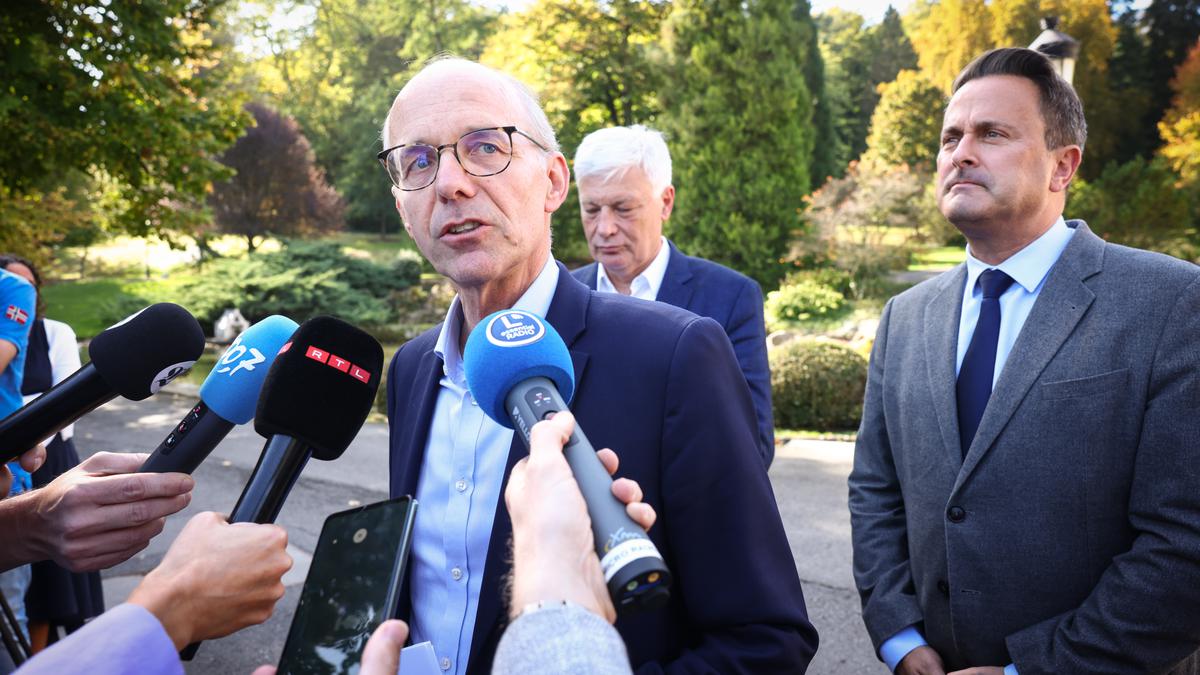Sudden Tax Hike for French Cross-Border Workers Marks the End of a Four-Year Suspension ...
New Official Residence for Luxembourg's Crown Prince to Be Fully Funded by Grand Ducal Family ...
Three Self-Driving Cars Hit Luxembourg’s Roads: A Glimpse into the Future or a Threat to Jobs? ...
Frieden and Bettel Slam U.S. Tariffs: Restricting Trade Is a Lose-Lose Scenario ...
Luxembourg’s Economy on a Path to Moderate Recovery ...
Raiffeisen Bank CEO Predicts Relative Stability in Interest Rates for 2025 ...
Sudden Tax Hike for French Cross-Border Workers Marks the End of a Four-Year Suspension

Luxembourg – April 11, 2025
France officially opened its 2025 income declaration period on April 10. However, for many cross-border workers—particularly those earning income in both France and Luxembourg—this tax season brings an unexpected financial shock. What lies behind this abrupt change?
Return of the Tax Increase: No More Delays This Time
After a four-year suspension, thousands of French residents living near the Luxembourg border will once again face higher taxes this year. The increase stems from a bilateral tax treaty signed between France and Luxembourg in 2018, which was first applied in 2020 without prior warning, triggering widespread protests. In response, the French government temporarily suspended implementation. That suspension has now officially ended in 2024.
Shift in Tax Calculation: From Exemption to Tax Credit
Under the new rules, income earned in Luxembourg is no longer exempt from French tax calculations. Instead, taxes already paid in Luxembourg will now be treated as a tax credit. This adjustment means Luxembourg-based income will now be included when calculating the effective tax rate in France.
Previously, cross-border workers could deduct the taxes paid in Luxembourg from their taxable income in France. That option has been removed. In practice, this results in a higher taxable base and, consequently, a higher overall tax rate.
Who Will Be Affected?
The tax hike applies specifically to individuals who earn income in both France and Luxembourg. Some examples include:
A cross-border worker employed in Luxembourg who owns a rental property in France.
Married or civil union couples where one partner works in France and the other in Luxembourg.
Luxembourg residents who earn rental income from properties located in France.
In contrast, couples where both partners work exclusively in Luxembourg and have no French income are not affected. The same applies to single individuals working solely in Luxembourg without any income derived from France.
A Reform with No Transparency
These changes result directly from the 2018 tax treaty between France and Luxembourg. The agreement aimed to eliminate double taxation and clarify the tax treatment of remote working for cross-border employees. However, despite promises by the French government to release an impact study prior to full implementation, no such study has ever been published.
"Tax on Tax": Cross-Border Workers React
While the reform may not technically constitute double taxation, many cross-border workers feel they are effectively paying tax on tax.
Séverine Bergé, director of the accounting and tax advisory firm Néofisc, described the new system as “a disguised form of double taxation.”
Meanwhile, Philippe Manenti, president of the Cross-Border Workers’ Rights Defense Committee (CDIFL), who organized a protest on March 21, warned:
“If this law goes into effect, cross-border workers will be crushed.”
French Government: A Step Toward Tax Fairness
From the government's perspective, the reform is a matter of tax justice. Officials argue that workers employed solely in France have been paying more taxes than their cross-border counterparts, despite having similar incomes. This reform, they claim, will correct that imbalance.
Amélie de Montchalin, France’s Minister for Public Accounts, stated before the National Assembly on Tuesday, April 8:
“This change in calculation method may affect tax rates on other domestic income as well. These reforms are designed to promote tax fairness, and the 2018 agreement will be fully applied to income earned from 2024 onward.”
Yet for many cross-border workers, such reasoning fails to justify the loss of a substantial tax advantage. Unless a last-minute reversal occurs—like in 2020—this tax reform is set to proceed as planned. The final outcome could be a significant decline in Luxembourg's appeal as a workplace for French residents.
New Official Residence for Luxembourg's Crown Prince to Be Fully Funded by Grand Ducal Family

Luxembourg – April 11, 2025
A new official residence is currently under construction within the grounds of Château de Berg, where Prince Guillaume, Crown Prince of Luxembourg, and his family are expected to move later this year. According to Prime Minister Luc Frieden, the project is being financed entirely by the Grand Ducal family, without any use of public funds.
Constitutionally Mandated Residence
Under the Luxembourg Constitution, the Grand Duke is not permitted to choose his place of residence freely. Instead, the law stipulates that the reigning sovereign must reside at Château de Berg, located in Colmar-Berg. In accordance with this constitutional provision, a new official building is being developed on the estate to accommodate the Crown Prince and his family, who are expected to take up residence in October 2025.
The official transition of power, which will mark the beginning of Guillaume’s reign as Grand Duke, is scheduled to take place on Friday, October 3, 2025.
A Family-Oriented Environment
In a statement issued in July 2024, Prince Guillaume expressed his family’s desire for privacy and a nurturing home environment for their children:
“We wish for our children to grow up in an intimate and family-centered environment.”
Prime Minister Frieden confirmed that the new residence is being funded entirely through private means, noting that no taxpayer money would be allocated to the project.
Neither a Gift Nor a Privilege
Frieden emphasized that the construction of the residence does not constitute a personal privilege or benefit for the Crown Prince, as it stems from a constitutional requirement regarding the official domicile of the sovereign.
He further clarified that the state's contribution to the project is purely symbolic, amounting to a nominal sum of one euro.
Legally Approved at the Local Level
To facilitate the project, the municipality of Colmar-Berg has modified its general development plan. In response to a parliamentary inquiry from Frantz Fayot, a member of the Socialist Workers’ Party (LSAP), the Prime Minister stressed that the procedure is fully compliant with local legal frameworks.
He stated:
“Municipalities not only have the competence but also bear full responsibility for the planning and development of their territories. In this regard, they enjoy broad discretionary authority.”
While the construction of this new residence reflects a continuation of royal tradition, it is being carried out with full adherence to legal and financial transparency. The project has been widely viewed as a model of accountability and responsible governance in matters of public interest.
Three Self-Driving Cars Hit Luxembourg’s Roads: A Glimpse into the Future or a Threat to Jobs?

Luxembourg – April 11, 2025
A new chapter in Luxembourg’s transportation landscape has quietly begun—though for now, limited to a single region. Over the past few days, three autonomous vehicles have been spotted navigating public roads in Lenningen, as part of a government-sanctioned pilot project aimed at testing the capabilities of driverless technology.
Government Issues First Official Permit for Autonomous Vehicle Testing
Yuriko Backes, Luxembourg’s Minister for Mobility and Public Works, has formally granted the country’s first ministerial permit for scientific testing of autonomous vehicles to Pony.ai Europe SARL. Under the terms of the authorization, the vehicles will operate within the municipality of Lenningen for a period of one year, under human supervision, to assess their technical performance, safety, and overall functionality.
The project is being implemented in collaboration with Voyages Emile Weber, a local transportation company. Each of the vehicles is clearly marked with a “Scientific Test” label and must, according to the official protocol, be manned by trained personnel who oversee and supervise their operation.
Government: A Crucial Step Toward a Smarter Future
Speaking at the license handover ceremony, Minister Backes hailed the initiative as a milestone on the road to future mobility:
“The issuance of this permit marks an important step toward the future of transportation. Autonomous driving is a major innovation that has the potential to transform our daily lives. The government is committed to supporting companies like Pony.ai in the development of cutting-edge technologies, while also working to enhance safety and efficiency in mobility.”
LCGB Union: Innovation Must Not Come at the Expense of Jobs
While the autonomous vehicle pilot is being celebrated as a leap forward in innovation, LCGB, one of Luxembourg’s major labor unions, has voiced serious concerns over the potential impact of such technology on the job market.
In a statement released last Friday, LCGB warned that innovation should not be used as a justification for eliminating driving jobs:
“We are deeply concerned that the widespread deployment of this technology could lead to a significant reduction in jobs within the transport sector, ultimately threatening the economic stability of many families.”
The union has called for the immediate launch of a constructive social dialogue involving the government, employers, and workers' representatives to proactively address the social and economic implications of automation.
Clear Regulatory Framework Urgently Needed
LCGB has also urged the government to establish a clear and transparent regulatory framework for the use of autonomous vehicles. This framework, the union argues, must include provisions for user safety, liability in the event of accidents, and ethical guidelines for the deployment of AI-based technologies.
In addition, LCGB insists that the transition to autonomous transport must be accompanied by robust training and reskilling programs for current workers, in order to mitigate the risks of widespread unemployment and to ensure that the benefits of automation are shared across society.
A Turning Point for Urban Mobility
The arrival of self-driving cars on Luxembourg’s streets signals a pivotal transformation in the nation’s approach to transportation. While the technology promises greater convenience, reduced emissions, and smarter infrastructure, it also raises fundamental questions about the future of traditional employment structures in the transport sector.
As Luxembourg embraces the future of mobility, the challenge now is to strike a balance between innovation and inclusion—ensuring that progress does not leave workers behind.
Frieden and Bettel Slam U.S. Tariffs: Restricting Trade Is a Lose-Lose Scenario

Luxembourg – April 11, 2025
In response to the United States’ announcement of a 20% tariff on all imports from Europe, Luxembourg’s Prime Minister Luc Frieden and Deputy Prime Minister and Minister for Foreign Trade Xavier Bettel strongly condemned the move, calling it detrimental to the global economy.
Bettel: Trade Restrictions Harm Consumers on Both Sides of the Atlantic
In a sharply worded statement, Xavier Bettel described the U.S. decision as “irrational” and warned that while retaliatory measures may be necessary, they are likely to carry significant negative consequences.
“Restricting trade is almost always a lose-lose scenario,” Bettel stated. “Many Americans voted for Donald Trump on the promise that he would lower inflation. But with decisions like this, it's hard to believe inflation will go down.”
According to Bettel, the true cost of such poor political choices will be borne by consumers, both in Europe and the United States.
He further criticized Washington’s lack of cooperation, noting:
“The European Union has thus far been pragmatic and gave the U.S. ample opportunity to reconsider its position. But it seems the Americans simply ignored that opportunity.”
Bettel also warned of the long-term consequences, suggesting that companies may shift production from Europe or Asia directly to the United States—or vice versa.
“Ultimately, this kind of economic rivalry leads to massive waste of financial resources and forces manufacturers to constantly question where, how, and for which market they should invest.”
Retaliatory Measures in the Pipeline
The European Commission is currently working on a set of retaliatory trade measures, which will soon be presented to EU member states for consideration. Bettel commented:
“We need to assess the damage these tariffs cause us and identify vulnerabilities on the American side that can be targeted in response. Frankly, it’s regrettable that trade relations have reached this point. This situation benefits neither the global economy nor the predictability of markets.”
Frieden: Tariffs Are an Obstacle to Global Trade
Prime Minister Luc Frieden also spoke out on Thursday in an interview with RTL, calling the U.S. policy a step backward for free trade and a serious challenge to international economic cooperation.
“Customs duties are always an obstacle, and for that reason, they are usually harmful,” Frieden said.
He emphasized the need for dialogue and coordination among European countries, urging leaders to resolve the crisis through diplomacy rather than escalating into a trade war. Frieden also revealed that he had discussed the matter over the weekend with Ursula von der Leyen, President of the European Commission.
While the specific impact of the tariffs on Luxembourg’s economy has not yet been fully assessed, the Prime Minister stressed that the current climate demands European unity and a coordinated response to mitigate the fallout and protect the continent’s economic interests.
Luxembourg’s Economy on a Path to Moderate Recovery

Luxembourg – April 11, 2025
As part of the European Semester review, economic stakeholders and social partners gathered this week at the Château de Senningen to evaluate the latest economic indicators of the Grand Duchy. According to the assessments presented, Luxembourg’s economic outlook for 2025 and beyond suggests modest yet stable growth.
Public Finances Remain on Solid Ground
Gilles Roth, Minister of Finance, stated during the meeting that public finances remained stable in 2024. Government administrations collectively achieved a budget surplus of approximately €890 million, which corresponds to around 1% of GDP.
He attributed this positive result largely to the improved performance of the central administration, which managed to reduce its deficit to €99 million, down from €1.5 billion the previous year.
Public Debt Increase Tied to Investment Strategy
Despite the fiscal surplus, Roth noted that Luxembourg’s public debt rose by €2.4 billion over the past year, reaching €22.6 billion. However, he clarified that this increase stems from the issuance of government bonds for the same amount, and that the funds remain available in the state treasury.
“This money is still in the Treasury accounts and is intended for future strategic projects,” Roth emphasized.
A Focus on Sustainable and Inclusive Growth
Also present at the session was Lex Delles, Minister of the Economy, who joined Roth in stressing the importance of steering the country toward a resilient, inclusive, and sustainable economic model. Both ministers highlighted global risks, inflationary pressures, and geopolitical tensions as key challenges requiring a measured and socially balanced approach to growth.
They outlined the government's top investment priorities for the coming years, which will focus on three key sectors:
Defense
Housing
Energy
Balancing Growth with Fiscal Responsibility
While the European Semester meeting portrayed a picture of slow but steady recovery, it also underscored the importance of responsible resource management and targeted investment strategies. Analysts believe that Luxembourg’s disciplined budgetary policies and strategic allocation of resources will strengthen the country's resilience against global economic volatility and lay a more solid foundation for long-term prosperity.
Raiffeisen Bank CEO Predicts Relative Stability in Interest Rates for 2025

Luxembourg – April 11, 2025
Laurent Zahles, CEO of Raiffeisen Bank Luxembourg, has forecast a period of relative stability in interest rates for 2025. Speaking in an interview with RTL Radio, Zahles noted that while decisions by the European Central Bank (ECB) play a role, rates offered to consumers are ultimately shaped by a wider set of economic and market-driven factors.
Two or Three Minor Rate Cuts Likely, But Not Game-Changing
According to Zahles, the ECB may implement two or three minor rate cuts by the end of 2025, but he cautioned that these would not be sufficient to dictate the broader direction of consumer lending rates.
“The interest rates presented to clients are not determined solely by the ECB’s base rate,” Zahles explained. “They are also influenced by each bank’s refinancing policies, market competition, and investment conditions.”
Why Lending Rates React Faster Than Savings Returns
When asked why banks tend to pass ECB rate hikes more quickly onto loans than onto savings accounts, Zahles emphasized that financial institutions must evaluate a complex mix of parameters before adjusting rates. Final decisions, he said, are heavily influenced by market competition and capital conditions.
He also clarified that no fixed correlation exists between central bank rates and variable interest rates:
“These are more closely tied to each bank’s internal refinancing strategies and risk management structures than to any single benchmark.”
Housing Market Split: Demand for Existing Homes Rises as Trust in New Projects Declines
Turning to the housing market, Zahles described a notable shift that began in Q2 2024: while interest in existing homes is on the rise, demand for newly built or off-plan properties (VEFA) continues to decline.
He attributed this divergence not to interest rates but to higher prices and a growing lack of trust in new development projects.
“The key question is: how do we restore buyers’ confidence in new construction?”
Although current interest rates are lower than in 2023–2024, Zahles does not anticipate further significant cuts. Instead, he stressed that price correction remains the most critical factor for reactivating the housing market. Developers, he suggested, should ask themselves whether they’ve fully explored all pricing optimization strategies.
U.S. Tariffs: Markets Stay Cautious but Calm
Zahles also addressed recent tariff announcements by the United States, noting that while the implications are difficult to assess at this stage, Raiffeisen investors have so far remained calm.
“The final impact will depend heavily on the scope of retaliatory measures and the outcome of international negotiations,” he said, adding that the market remains cautiously stable despite geopolitical tensions.
Complex Banking Regulations Call for Urgent Reform
In the final portion of the interview, Zahles raised concerns over the growing complexity of banking regulations, which he said is not only placing strain on financial institutions but also confusing customers.
“Our clients call us daily, frustrated by constantly changing documentation and compliance requirements. It’s an exhausting process.”
He called for a risk-based approach to regulation rather than the continuous layering of new rules. Zahles highlighted the European Commission’s ‘Omnibus’ initiative, spearheaded by Ursula von der Leyen, as a potentially promising step—though he acknowledged that no tangible progress has yet been seen.
